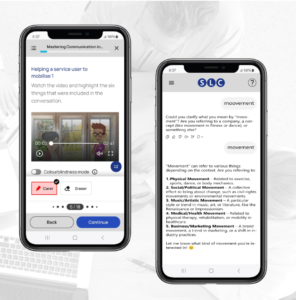
SLC win Ufi grant to develop AI language learning app for social carers
We’re delighted to have won a grant from Ufi VocTech Trust to develop an AI-driven technology solution that provides cheap phone-based language and communication skills

In some languages, it’s important to use the correct form of address when asking politely. Perhaps your language has two or more forms of the pronoun ‘you.’ In English, we have only one form. That’s why there are other ways to show your politeness when you speak. And it’s the length of the question that shows how polite you want to be.
As a general rule, if you want to be extremely polite, make your question as grammatically complicated as possible. The less you phrase your request as a direct question, the more polite it sounds. Culturally, that may not make much sense to you. But it’s the reason that in English, there are many questions that don’t sound like questions.
Are you studying Medical English? If you are, then it’s important that you phrase your questions with the correct level of politeness. And for passing the OET speaking section, you’ll need to use the appropriate register. Maybe you know about modal verbs like ‘can’ and ‘could.’ But did you know that if you want to make your question more polite, you can use ‘was’? And that negatives like ‘don’t’ in a question are the ultimate in politeness?
Below is SLC’s general guide to the order of politeness in questions. If you want a deeper dive into using the correct grammar for healthcare, we’ve got you covered. We have courses in both Essential and Advanced Grammar for Healthcare.
grammar | example question | politeness rating |
‘Can’ as modal verb | Can you stand up for me? | *
|
‘Could’ as modal verb | Could you give me your full address? | ** |
be + able to | Are you able to prescribe this particular medication for Mrs Smith? | *** |
was wondering + if + subject + modal verb | I was wondering if you could provide me with the patient’s medical record. | **** |
don’t suppose + subject + modal verb | I don’t suppose we could collaborate on this patient’s care plan? | ***** |

Stephanie Lam is a writer, journalist, and English teacher. She specialises in writing fabulous words for the wellbeing and health industries.
SLC was the OET-accredited Premium Preparation Provider in Europe and is the leading provider of OET preparation services to the UK National Health Service.
SLC offers a wide range of OET preparation services, including self-study, tutoring, practice tests, and writing correction.
SLC’s ground-breaking online Medical English courses gives you the language you need to work, study and collaborate in an English-speaking environment.
Get updates and get the latest materials on Medical English, OET and IELTS

We’re delighted to have won a grant from Ufi VocTech Trust to develop an AI-driven technology solution that provides cheap phone-based language and communication skills

We’re delighted to announce a partnership with leading Medical English app, Doxa.
